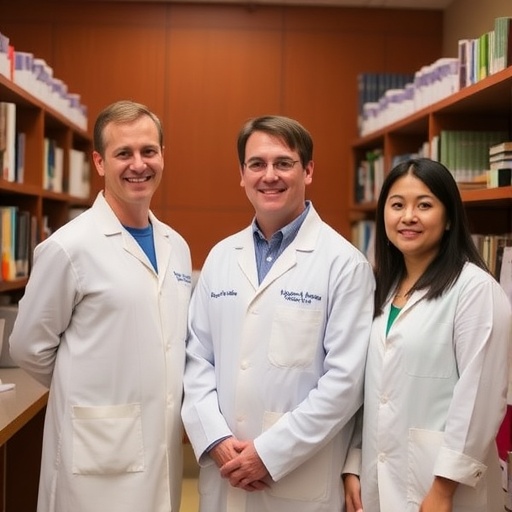Boston University’s Chobanian & Avedisian School of Medicine has secured a significant five-year funding award of $2.1 million from the National Institute of General Medical Sciences (NIGMS), part of the National Institutes of Health (NIH), to advance its predoctoral training program in biomolecular pharmacology. The grant supports a T32 training initiative entitled “Training in Biomolecular Pharmacology,” designed to nurture a new generation of scientific leaders with expertise at the intersection of pharmacology and cutting-edge biomedical technologies. This program will annually fund four emerging researchers, enabling them to engage in intensive two-year training periods that blend rigorous research with multidisciplinary education.
Originally established in 1991 by renowned pharmacologist Dr. David Farb, the program has continuously evolved to incorporate advances in drug discovery, cellular biology, and molecular genetics. Its foundation remains steadfast in fostering interdisciplinary approaches aimed at deciphering the biochemical mechanisms underlying therapeutic interventions. Today, the program emphasizes precision therapeutics, integrating next-generation methodologies to tailor drug design and development at the molecular level. This strategic evolution mirrors the wider trend in biomedical research toward personalized medicine, where pharmacological strategies are increasingly informed by genomic and proteomic insights.
Dr. Hui Feng, an associate professor of pharmacology and medicine, as well as director of the Laboratory of Zebrafish Genetics and Cancer Therapeutics at Boston University, serves as one of the program’s principal investigators. Dr. Feng highlights the program’s ambition to cultivate a cadre of independent investigators, industry innovators, educators, and policy influencers who are adept in multidisciplinary research contexts. Their training encompasses collaboration with internationally recognized faculty whose expertise spans structural biology, genomics, biochemistry, and biomedical engineering. This diverse mentorship is intended to stimulate innovative thinking and accelerate the translation of basic research findings into viable clinical applications.
The structured predoctoral curriculum immerses trainees in a broad array of scientific fields and techniques that are pivotal in modern pharmacology. Participants engage deeply with chemical biology, structural and cell biology, genomics, and systems biology. The teaching framework combines didactic coursework with immersive research experiences, complemented by seminars highlighting seminal papers and dialogue with leading authors, thereby fostering a dynamic and collaborative learning environment. Crucially, trainees are exposed to cutting-edge methodologies such as high-throughput screening, CRISPR-based genetic editing, and computational drug discovery platforms.
Admission to this T32-funded program is primarily through Boston University’s pharmacology program within the Department of Pharmacology, Physiology & Biophysics, or through the MD-PhD dual-degree program, offering a robust integration of clinical and research training. Dr. Venetia Zachariou, Professor and Chair of the department, emphasizes the program’s integrated curriculum that enriches foundational pharmacological knowledge with specialized instruction aligned with each trainee’s primary discipline. This approach ensures that students attain not only breadth but also depth in their understanding of drug action mechanisms and therapeutic innovation.
Central to the curriculum are core pharmacological principles that explore the interactions of bioactive molecules, mechanisms of drug delivery, and the utilization of animal models to simulate human pathophysiology for therapeutic testing. The core also integrates instruction on novel drug discovery techniques, encompassing target validation, lead compound optimization, and pharmacokinetic/pharmacodynamic modeling. By emphasizing translational science, trainees are equipped to bridge laboratory discoveries with clinical applications, a skill set increasingly demanded within pharmaceutical and biotech industries.
The program’s innovative training modalities include retreats and journal clubs that foster critical discussion and peer review skills, essential components for cultivating scientific rigor and integrity. Workshops on grant writing, scientific communication, and career development are embedded within the framework, preparing participants to navigate the competitive landscape of biomedical research careers. Moreover, networking opportunities facilitated by the program connect trainees with a global community of leaders in pharmacological science and related disciplines, expanding their professional horizons.
A unique feature of the program lies in its utilization of zebrafish genetics as a model system through Dr. Feng’s laboratory. Zebrafish offer a powerful vertebrate platform for high-throughput phenotypic screening and in vivo investigation of cancer therapeutics and drug-induced toxicities. Leveraging the transparency and genetic manipulability of zebrafish embryos, trainees can perform large-scale pharmacological assays that provide mechanistic insights into drug effects and disease pathways, markedly accelerating the pace of biomedical discovery.
As precision medicine continues to transform healthcare, the program aligns itself at the forefront of this paradigm shift by integrating genomic and biochemical data to innovate targeted therapeutics. Coursework and research experiences emphasize the critical role of structural biology techniques like cryo-electron microscopy and X-ray crystallography in elucidating drug-target interactions. These methods enable the rational design of molecules with enhanced efficacy and specificity, minimizing off-target effects and toxicities.
The NIGMS T32 award reaffirms Boston University’s commitment to sustaining a pipeline of highly skilled pharmacologists equipped to meet contemporary scientific and societal challenges in drug development. In a research landscape marked by rapid technological innovation and complex biomedical questions, such training programs are essential to fostering scientists capable of driving therapeutic innovations from bench to bedside. The T32 grant thus represents both an investment in scientific expertise and a strategic response to the urgent need for multidisciplinary approaches in pharmacological research.
Through this comprehensive and integrative training environment, the next generation of pharmacologists trained at Boston University will be uniquely positioned to lead efforts in precision therapeutics, translating complex biomolecular insights into novel treatments for a range of diseases. The program’s success will be measured not only by the scientific contributions of its trainees but also by their leadership in academia, industry, and healthcare policy, shaping the future of medicine.
Subject of Research: Biomolecular Pharmacology and Training in Precision Therapeutics
Article Title: (Information not provided)
News Publication Date: (Information not provided)
Web References: (Information not provided)
References: (Information not provided)
Image Credits: (Information not provided)
Keywords: Pharmacology, Biomolecular Pharmacology, Drug Discovery, Precision Therapeutics, Pharmacological Training, Zebrafish Genetics, Cancer Therapeutics, Structural Biology




